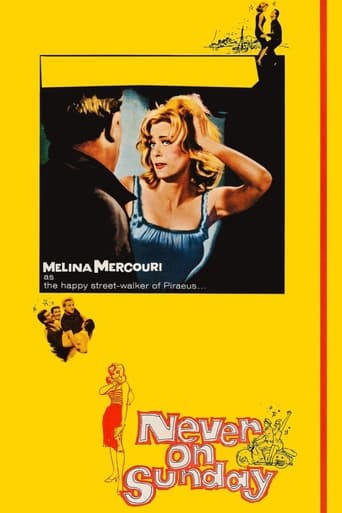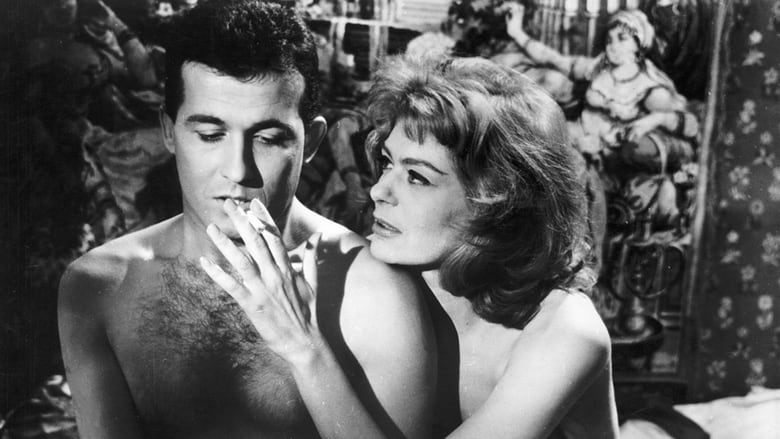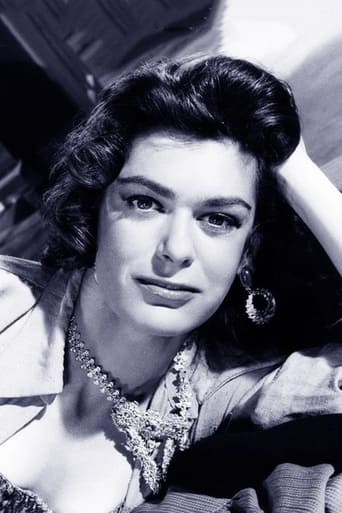

Never on Sunday (1960)
An American scholar in Greece sets about improving the prostitute with whom he is infatuated.
Watch Trailer
Cast


Similar titles
Reviews
Hollywood blacklist Jules Dassin's Greek comedy, starring his future wife and muse Mercouri, which was a sensational success, acquired 5 Oscar nominations (including BEST DIRECTOR and LEADING ACTRESS, with one win for BEST SONG, the titular NEVER ON Sunday, a record- breaking first-time for a foreign movie). The story is a variation of the Pygmalion, a delectable tug- of-war between a golden-heart Greek prostitute's free spirit and an amateur American philosopher's attempt to save her from the oldest profession.Ilya (Mercouri), a sought-after prostitute lives in the port of Piraeus, who exerts her own volition instead of the highest bid when comes to choose her customer, she meets Homer (Dassin), an American tourist, the scholar type, who clashes with denizens in a bar brawl on grounds of baffling cultural disparity, and reeks of the superior Western morality to persuade Ilya from doing what she does best, Homer is seeking for the truth in the cradle of culture, and immediately correlates Ilya with the fall of the Ancient Greece, it is beyond his understanding why such a marvel of beauty could be so content with her debased occupation. Through their entanglement, especially their vastly contradictory interpretations about Greek tragedy, they agree to try out a tentative plan, Ilya stops receiving her patrons and Homer educates her with literature and philosophy, but a less convincing plot-device eventually would set her back to her larger-than-life spirit, Homer's experiment fails miserably, just one time, a prostitute doesn't need salvation, her Greek blood renders her unbridled exuberance and spontaneity, that's something no education can alter, like her passionate romance with local worker Tonio (Foundas)This Black-and-White picture is a winsome culture-clashing curio, Mercouri unleashes her divine charisma which infatuates not just Homer and her regular clientèle, also us, wide-eyed viewers as well, her personification as the object of passion, a magnificent force-of-nature defies all the earthly categorization, eventually becomes an invitation card for people to visit her enchanting motherland; to that effect, Dassin sacrifices her character for bookish caricature, utters "Ilya, you are a Greek, you must be logical, since it is established by Aristotle" and a devoted second fiddler for Mercouri to hog the limelight entirely. Behind the camera, Dassin is bent on infusing a thumping pulse of vivacity to the not-so-original script, influences a well-calculated balance between exotica and erotica. Fairly speaking, the settings of its characters are reasonably behind our time, and the arc of Ilya's transition is done perfunctorily, otherwise, the appreciation could have been higher by a new wave of audience.
One of the greatest comedies of all time, Never on Sunday is an excellent examination of cultural imperialism and the clash between two very different outlooks.The character of Homer has the limitation of being unwilling to see the world through any other eyes but his own: his narrow-mindedness means he cannot see the very thing he is seeking on his quest. The Greeks have moved beyond a search for the truth, being content in their carefree lifestyle. The imperialist ambitions of ancient Athens are no longer a concern for them but, for the Americans, just setting out on their empire building, they are a priority.Homer's attempts to force the Greek population to fit his image of what they should be is an attempt at this very imperialism. Once the cradle of civilisation, he feels they should now conform to his world-view. Informed by the puritans and ancient philosophies long-rejected by the Greeks themselves, he forces himself onto a society onto which he cannot be grafted.He has the arrogance of an academic and does not understand human beings. His attempts at bettering Melina's character are attempts to force her to see his world-view. His belief he is truly bettering her is self-delusion.However, it is not solely the American character who imposes his view on others. Throughout the course of the film, the Greek port is visited in turn by the US, British and Russian naval fleets. Greece is clearly subjugated to each of these military empires now yet, somehow, it remains a happy place for they depart soon after, leaving the locals largely unaffected by their impositions.Melina's character's zest for life famously extends to the Greek tragedies. With the film's play within a play, she famously reinterprets the tragedy to conform to her world-view. Homer reacts angrily to this even though he is trying to force actual people to conform to his. (One has to wonder if Roland Barthes' "Death of the Author", published just seven years later was in anyway inspired by the ideas in this film of the audience constructing, albeit humorously, their own meaning and interpretation of the text.) The film's pace is fast and light-hearted and the many outdoor scenes reflect Melina's character's sunny mood. The soundtrack again is sprightly and energetic, encapsulating a zest for life and the film was exceptionally well-cast and acted.In the end, Homer of course achieves the aim of his quest by learning, when in Greece, do as the Greeks do. The simple lesson that it is love that will reform the girl is almost banal but here it works. She must be cared for and nurtured not forced to submit to the will of a foreigner.Ultimately, it is the comedy and the light-hearted way in which the moral of the story is expressed that makes this film delightful. Perfectly filmed and still humorous and highly relevant over fifty years after its release, this is one of the great comedies and one that this reviewer highly recommends.
Jules Dassin wrote, directed, and co-stars in this Greek-infused play on "Pygmalion", wherein an American scholar vacationing in Greece becomes obsessed with reforming the most popular prostitute in the village: a fiery local who picks and chooses her men--and celebrates alongside all her paramours with an 'open house' on Sunday. Melina Mercouri gives a star-making performance as the passionate Ilya, though Dassin, who also co-produced the film uncredited, may have taken on more than he could handle. The character of the professor (who's actually lusting in secret for Ilya) doesn't make a lot of sense, and Dassin's actorly turn in this role gives us little to go on (he's a blank). We understand that educating Mercouri's Ilya, in effect, replaces her sexual desires with a quest for knowledge, but one isn't sure how the professor personally hopes to benefit romantically from this denouement--nor how his plan relates to the greedy landlord who keeps raising the rent on all the prostitutes in town. The music and the film's celebration of life (and sex without need for attachments, which Dassin tells us can be cured by true love) put the movie over at the US box-office, but only Mercouri's delicious performance remains memorable today. **1/2 from ****
I haven't seen "Never on Sunday" in ages but I remember it as a really wonderful comedy. This was the very first time I saw Melina Mercuri -- and it's she and the Greek musical sound track that made it so pleasurable. The story doesn't matter really: It's enough to know that Mercuri plays a prostitute with a gift for joy and denial of harsh realities. If I remember correctly, she has a way of rewriting Greek tragedies in her head so that, at the end, "everyone goes to the seashore." I imagine that the film isn't as vivid as it was in its day because while the scenery was beautiful the photography was not special. You might not like Jules Dassin as Mercuri's foil -- he acted in as well as wrote and directed the film -- but see it for Mercuri. She played roles of greater significance in films that were perhaps more artful. But she is luminous and funny and sweet and gorgeous in this picture.











